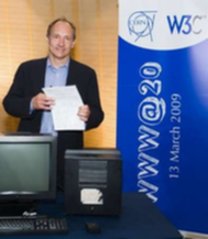万维网(World Wide Web)诞生20周年纪念活动3月13日在瑞士日内瓦举行。“万维网之父”蒂姆•伯纳斯•李出席纪念活动,回顾万维网诞生过程,对网络发展前景寄予厚望,同时也表达对网络广告泛滥、隐私难保等现象的忧虑。在伯纳斯-李看来,20年过去,万维网的发展潜力远没有完全展现。“万维网(的发展)没有完结,这只是冰山一角。我确信新变化将更加震惊世界。” 他还预言手机今后将成为网络应用新领域。万维网作为一项意义重大的发明,在伯纳斯-李眼中却并非完美。他说,网络用户的上网习惯和在社交网站等输入的信息等可能被系统自动记录后遭他人利用,使个人隐私难以保全,“避免这种窥探行为非常重要”。
|

|
|
Tim Berners-Lee said to be inventor of the World Wide Web poses during a photo call before a conference marking the 20th anniversary of the web at the European Organization for Nuclear Research (CERN) in Meyrin near Geneva March 13, 2009.
|
The World Wide Web (WWW) on Friday marked its 20th anniversary and its founders admitted there were bits of the phenomenon they do not like: advertising and "snooping."
The creation of the web by British computer software genius Tim Berners-Lee and other scientists at the European particle physics laboratory (CERN) paved the way for the Internet explosion which has changed our daily lives.
Berners-Lee and former colleagues such as Robert Cailliau, who originally set up the system to allow thousands of scientists around the world to swap, view and comment on their research, regardless of the distance or computer system, took part in commemorations on Friday at the laboratory.
"Back then there were 26 web servers. Now there are 10 to the power 11 pages, that's a many as the neurones in your brain," said Berners-Lee, who still has an active hand in the web's development.
In March 1989, the young Berners-Lee handed his supervisor in Geneva a document entitled 'Information Management: a proposal."
The supervisor described its as "vague, but exciting" and gave it the go-ahead, although it took a good year or two to get off the ground and serve nuclear physicists in Europe initially.
Former CERN systems engineer Cailliau, who teamed up with Berners-Lee, said: "It was really in the air, something that had to happen sooner or later."
They drew up the global hypertext language -- which is behind the "http" on website addresses and the links between pages -- and came up with the first web browser in October 1990, which looks remarkably similar to the ones used today.
"Everything that people talk about today, blogs and so on, that's what we were doing in 1990, there's no difference. That's how we started," Cailliau told Swiss radio RSR.
The WWW technology was first made available for wider use on the Internet from 1991 after CERN was unable to ensure its development, and the organisation made a landmark decision two years later not to levy royalties.
"Without that, it would have died," commented Berners-Lee.
Cailliau still marvels at developments like wikipedia that allow knowledge to be exchanged openly around the web, but never imagined that search engines would take on the importance they have assumed today.
But the commercial development of the web irritates some of the founders, who prize its open and universal nature.
"There are some things I don't like at all, such as the fact that people have to live off advertising," said Caillau, who preferred the idea of direct "micro payments" to information providers.
"And there's the big problem of identity, of course, the trust between the person who is consulting and the person who provides the page, as well as the protection of children," he added.
Berners-Lee, now a researcher at Massachusetts Institute of Technology in the United States and a computer science professor at Southampton University in Britain, still heads the World Wide Web Consortium (3WC) that coordinates development of the web.
He expressed fears about the growing tendency to profile web users and detail their habits by collecting online data, often automatically.
"That sort of snooping is really important to avoid," he told the commemorative event here, heralding a future built on linked open data networks and mobile web use.
Lynn St. Amour, chief executive of the Internet Society, complained that the web is often wrongly confused with the wider Internet, a "network of networks."
"The Web is one -- albeit, the most influential and well known -- of many different applications which run over the Internet."
"The great achievement of Tim Berners-Lee was to recognise the power and potential in the Internet," she added.
(Agencies)

Vocabulary:
snooping: 窥探
European particle physics laboratory (CERN): 欧洲粒子物理实验室
in the air: 渺茫,未决
(英语点津 Helen 编辑)